brake light FIAT DOBLO COMBI 2012 Owner handbook (in English)
[x] Cancel search | Manufacturer: FIAT, Model Year: 2012, Model line: DOBLO COMBI, Model: FIAT DOBLO COMBI 2012Pages: 283, PDF Size: 6.31 MB
Page 157 of 283
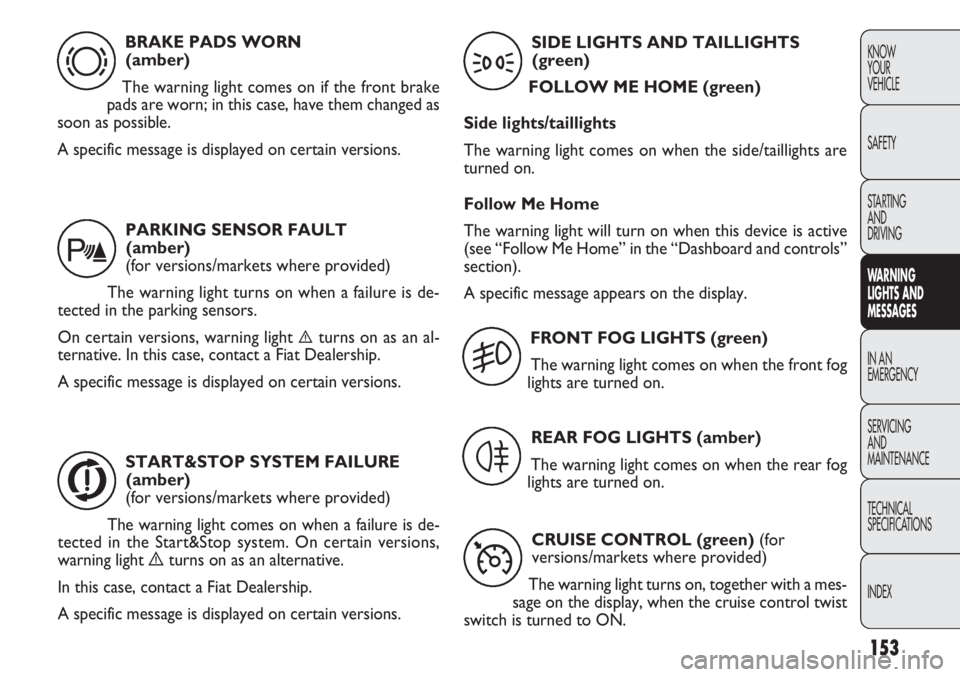
153
KNOW
YOUR
VEHICLE
SAFETY
STARTING
AND
DRIVING
WA R N I NG
LIGHTS AND
MESSAGES
IN AN
EMERGENCY
SERVICING
AND
MAINTENANCE
TECHNICAL
SPECIFICA TIONS
INDEXBRAKE PADS WORN (amber)
The warning light comes on if the front brake
pads are worn; in this case, have them changed as
soon as possible.
A specific message is displayed on certain versions.
d
PARKING SENSOR FAULT (amber)
(for versions/markets where provided)
The warning light turns on when a failure is de-
tected in the parking sensors.
On certain versions, warning light
èturns on as an al-
ternative. In this case, contact a Fiat Dealership.
A specific message is displayed on certain versions.
t
START&STOP SYSTEM FAILURE (amber)
(for versions/markets where provided)
The warning light comes on when a failure is de-
tected in the Start&Stop system. On certain versions,
warning light èturns on as an alternative.
In this case, contact a Fiat Dealership.
A specific message is displayed on certain versions.
j
SIDE LIGHTS AND TAILLIGHTS (green)
FOLLOW ME HOME (green)
Side lights/taillights
The warning light comes on when the side/taillights are
turned on.
Follow Me Home
The warning light will turn on when this device is active
(see “Follow Me Home” in the “Dashboard and controls”
section).
A specific message appears on the display.
3
FRONT FOG LIGHTS (green) The warning light comes on when the front fog
lights are turned on.
5
REAR FOG LIGHTS (amber)
The warning light comes on when the rear fog
lights are turned on.
4
CRUISE CONTROL (green) (for versions/markets where provided)
The warning light turns on, together with a mes-
sage on the display, when the cruise control twist
switch is turned to ON.
Ü
Page 160 of 283
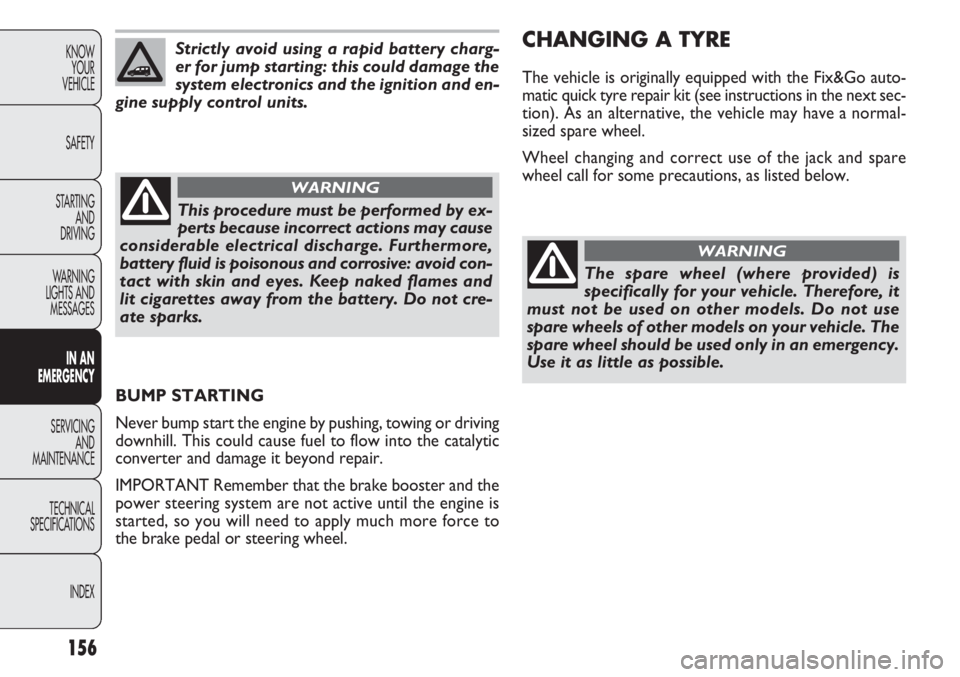
156
KNOWYOUR
VEHICLE
SAFETY
STARTING AND
DRIVING
WARNING
LIGHTS AND MESSAGES
IN AN
EMERGENCY
SERVICING AND
MAINTENANCE
TECHNICAL
SPECIFICA TIONS
INDEXStrictly avoid using a rapid battery charg-
er for jump starting: this could damage the
system electronics and the ignition and en-
gine supply control units.
This procedure must be performed by ex-
perts because incorrect actions may cause
considerable electrical discharge. Furthermore,
battery fluid is poisonous and corrosive: avoid con-
tact with skin and eyes. Keep naked flames and
lit cigarettes away from the battery. Do not cre-
ate sparks.
WARNING
BUMP STARTING
Never bump start the engine by pushing, towing or driving
downhill. This could cause fuel to flow into the catalytic
converter and damage it beyond repair.
IMPORTANT Remember that the brake booster and the
power steering system are not active until the engine is
started, so you will need to apply much more force to
the brake pedal or steering wheel.
CHANGING A TYRE
The vehicle is originally equipped with the Fix&Go auto-
matic quick tyre repair kit (see instructions in the next sec-
tion). As an alternative, the vehicle may have a normal-
sized spare wheel.
Wheel changing and correct use of the jack and spare
wheel call for some precautions, as listed below.
The spare wheel (where provided) is
specifically for your vehicle. Therefore, it
must not be used on other models. Do not use
spare wheels of other models on your vehicle. The
spare wheel should be used only in an emergency.
Use it as little as possible.
WARNING
Page 162 of 283
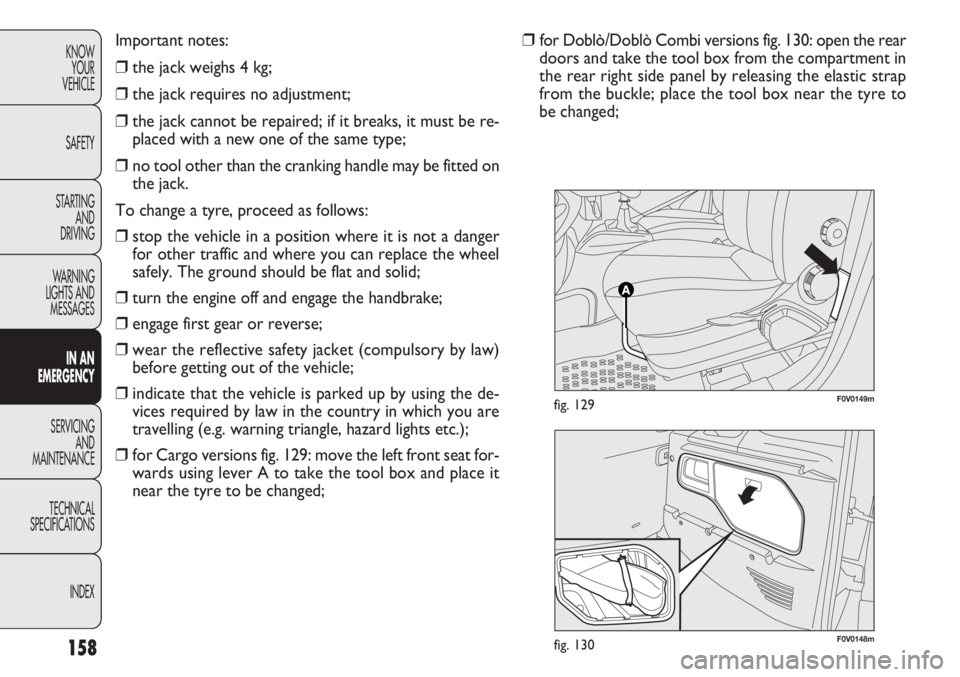
F0V0148mfig. 130
F0V0149mfig. 129
158
KNOWYOUR
VEHICLE
SAFETY
STARTING AND
DRIVING
WARNING
LIGHTS AND MESSAGES
IN AN
EMERGENCY
SERVICING AND
MAINTENANCE
TECHNICAL
SPECIFICA TIONS
INDEXImportant notes:
❒ the jack weighs 4 kg;
❒ the jack requires no adjustment;
❒ the jack cannot be repaired; if it breaks, it must be re-
placed with a new one of the same type;
❒ no tool other than the cranking handle may be fitted on
the jack.
To change a tyre, proceed as follows:
❒ stop the vehicle in a position where it is not a danger
for other traffic and where you can replace the wheel
safely. The ground should be flat and solid;
❒ turn the engine off and engage the handbrake;
❒ engage first gear or reverse;
❒ wear the reflective safety jacket (compulsory by law)
before getting out of the vehicle;
❒ indicate that the vehicle is parked up by using the de-
vices required by law in the country in which you are
travelling (e.g. warning triangle, hazard lights etc.);
❒ for Cargo versions fig. 129: move the left front seat for-
wards using lever A to take the tool box and place it
near the tyre to be changed; ❒
for Doblò/Doblò Combi versions fig. 130: open the rear
doors and take the tool box from the compartment in
the rear right side panel by releasing the elastic strap
from the buckle; place the tool box near the tyre to
be changed;
Page 169 of 283
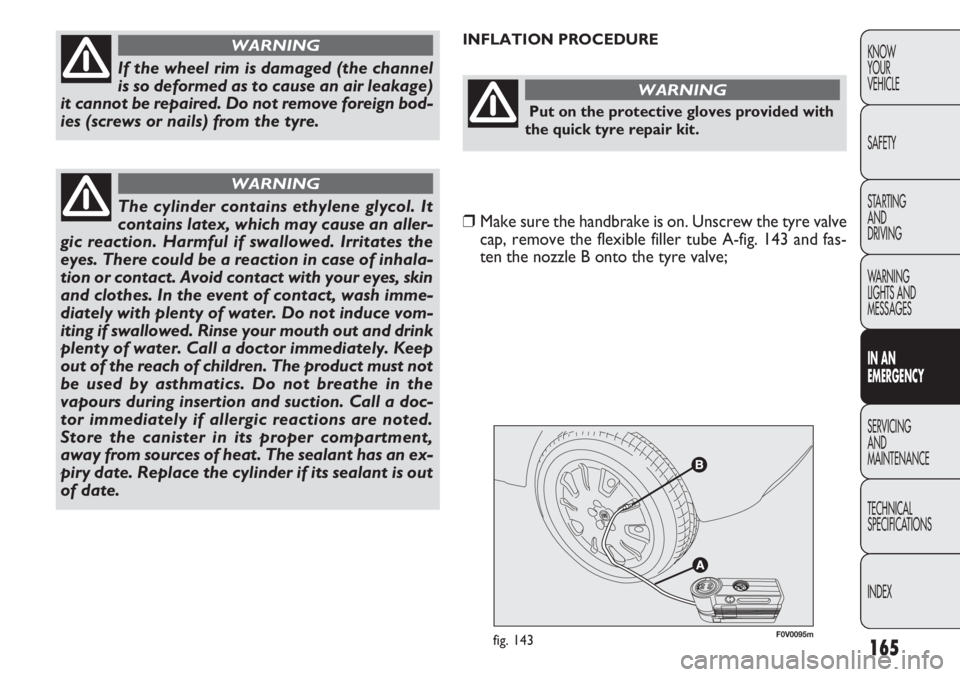
165
KNOW
YOUR
VEHICLE
SAFETY
STARTING
AND
DRIVING
WARNING
LIGHTS AND
MESSAGES
IN AN
EMERGENCY
SERVICING
AND
MAINTENANCE
TECHNICAL
SPECIFICATIONS
INDEX
F0V0095mfig. 143
INFLATION PROCEDURE
If the wheel rim is damaged (the channel
is so deformed as to cause an air leakage)
it cannot be repaired. Do not remove foreign bod-
ies (screws or nails) from the tyre.
WARNING
The cylinder contains ethylene glycol. It
contains latex, which may cause an aller-
gic reaction. Harmful if swallowed. Irritates the
eyes. There could be a reaction in case of inhala-
tion or contact. Avoid contact with your eyes, skin
and clothes. In the event of contact, wash imme-
diately with plenty of water. Do not induce vom-
iting if swallowed. Rinse your mouth out and drink
plenty of water. Call a doctor immediately. Keep
out of the reach of children. The product must not
be used by asthmatics. Do not breathe in the
vapours during insertion and suction. Call a doc-
tor immediately if allergic reactions are noted.
Store the canister in its proper compartment,
away from sources of heat. The sealant has an ex-
piry date. Replace the cylinder if its sealant is out
of date.
WARNING
Put on the protective gloves provided with
the quick tyre repair kit.
WARNING
❒ Make sure the handbrake is on. Unscrew the tyre valve
cap, remove the flexible filler tube A-fig. 143 and fas-
ten the nozzle B onto the tyre valve;
Page 171 of 283
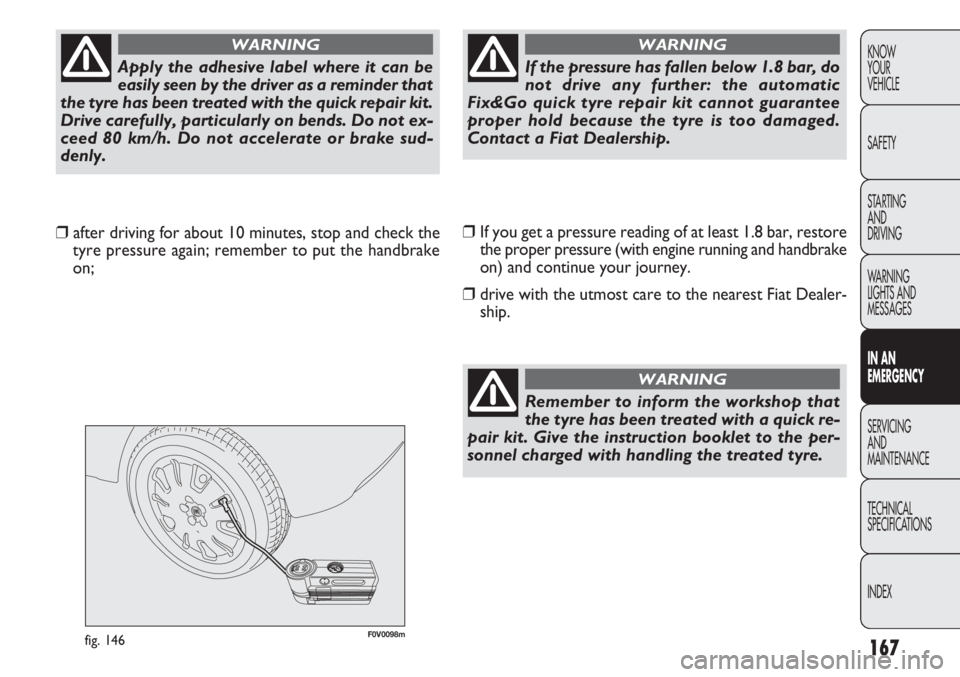
167
KNOW
YOUR
VEHICLE
SAFETY
STARTING
AND
DRIVING
WARNING
LIGHTS AND
MESSAGES
IN AN
EMERGENCY
SERVICING
AND
MAINTENANCE
TECHNICAL
SPECIFICATIONS
INDEX
F0V0098mfig. 146
❒ If you get a pressure reading of at least 1.8 bar, restore
the proper pressure (with engine running and handbrake
on) and continue your journey.
❒ drive with the utmost care to the nearest Fiat Dealer-
ship.
❒
after driving for about 10 minutes, stop and check the
tyre pressure again; remember to put the handbrake
on;
Apply the adhesive label where it can be
easily seen by the driver as a reminder that
the tyre has been treated with the quick repair kit.
Drive carefully, particularly on bends. Do not ex-
ceed 80 km/h. Do not accelerate or brake sud-
denly.
WARNING
If the pressure has fallen below 1.8 bar, do
not drive any further: the automatic
Fix&Go quick tyre repair kit cannot guarantee
proper hold because the tyre is too damaged.
Contact a Fiat Dealership.
WARNING
Remember to inform the workshop that
the tyre has been treated with a quick re-
pair kit. Give the instruction booklet to the per-
sonnel charged with handling the treated tyre.
WARNING
Page 175 of 283
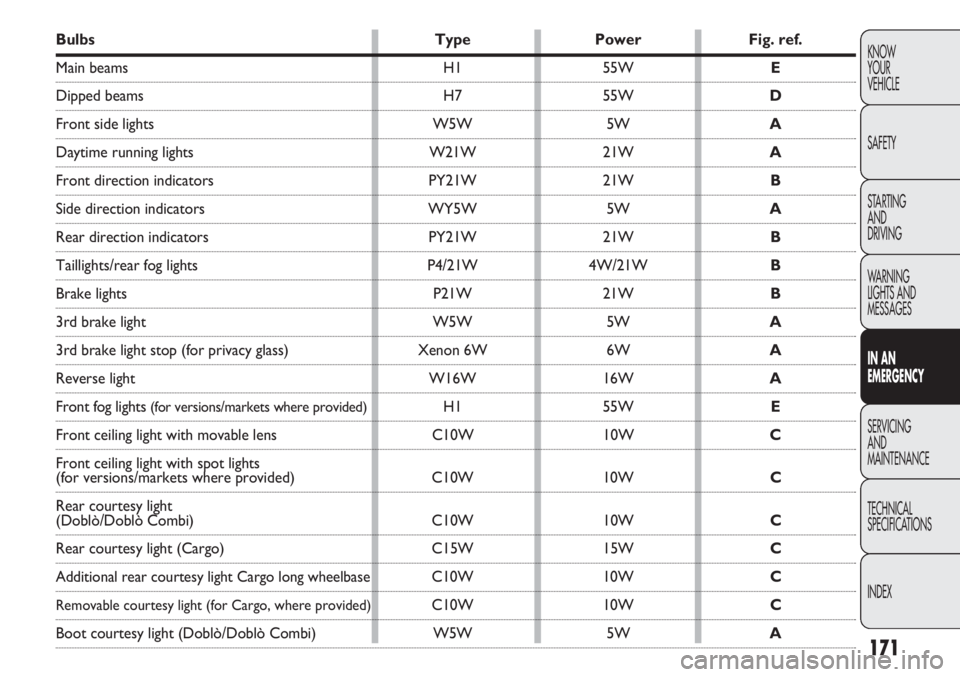
171
KNOW
YOUR
VEHICLE
SAFETY
STARTING
AND
DRIVING
WARNING
LIGHTS AND
MESSAGES
IN AN
EMERGENCY
SERVICING
AND
MAINTENANCE
TECHNICAL
SPECIFICATIONS
INDEXBulbs TypePowerFig. ref.
Main beams H155W E
Dipped beams H755W D
Front side lights W5W5WA
Daytime running lights W21W21WA
Front direction indicators PY21W21WB
Side direction indicators WY5W5WA
Rear direction indicators PY21W21WB
Taillights/rear fog lights P4/21W4W/21W B
Brake lights P21W21WB
3rd brake light W5W5WA
3rd brake light stop (for privacy glass) Xenon 6W6WA
Reverse light W16W16WA
Front fog lights (for versions/markets where provided)H155W E
Front ceiling light with movable lens C10W10WC
Front ceiling light with spot lights
(for versions/markets where provided) C10W10WC
Rear courtesy light
(Doblò/Doblò Combi) C10W10WC
Rear courtesy light (Cargo) C15W15WC
Additional rear courtesy light Cargo long wheelbaseC10W 10WC
Removable courtesy light (for Cargo, where provided)C10W 10WC
Boot courtesy light (Doblò/Doblò Combi) W5W5WA
Page 179 of 283
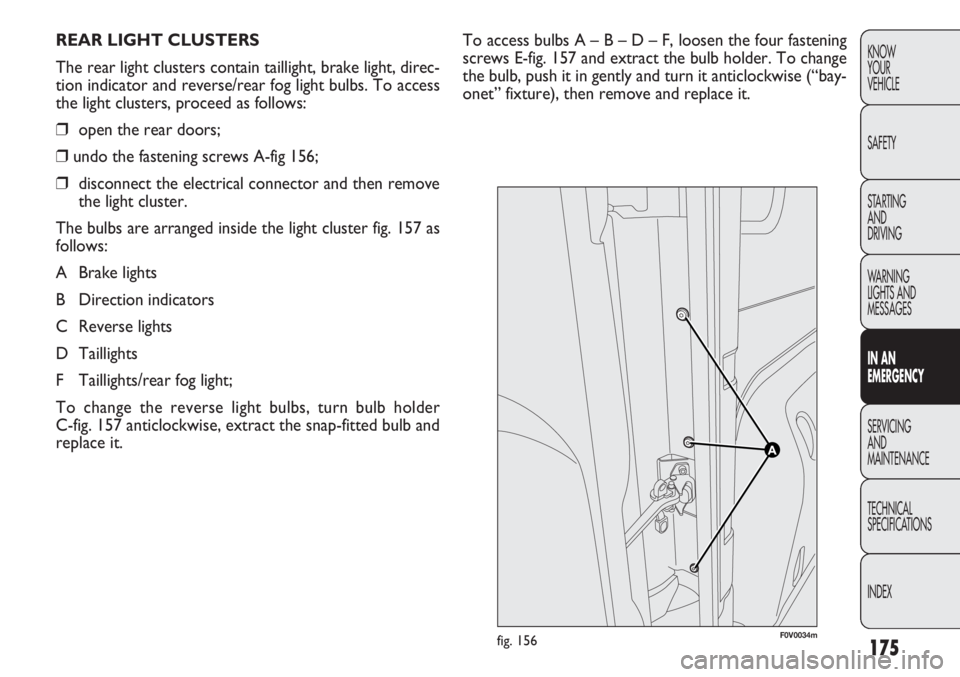
175
KNOW
YOUR
VEHICLE
SAFETY
STARTING
AND
DRIVING
WARNING
LIGHTS AND
MESSAGES
IN AN
EMERGENCY
SERVICING
AND
MAINTENANCE
TECHNICAL
SPECIFICATIONS
INDEXTo access bulbs A – B – D – F, loosen the four fastening
screws E-fig. 157 and extract the bulb holder. To change
the bulb, push it in gently and turn it anticlockwise (“bay-
onet” fixture), then remove and replace it.
REAR LIGHT CLUSTERS
The rear light clusters contain taillight, brake light, direc-
tion indicator and reverse/rear fog light bulbs. To access
the light clusters, proceed as follows:
❒
open the rear doors;
❒ undo the fastening screws A-fig 156;
❒ disconnect the electrical connector and then remove
the light cluster.
The bulbs are arranged inside the light cluster fig. 157 as
follows:
A Brake lights
B Direction indicators
C Reverse lights
D Taillights
F Taillights/rear fog light;
To change the reverse light bulbs, turn bulb holder
C-fig. 157 anticlockwise, extract the snap-fitted bulb and
replace it.
F0V0034mfig. 156
Page 180 of 283
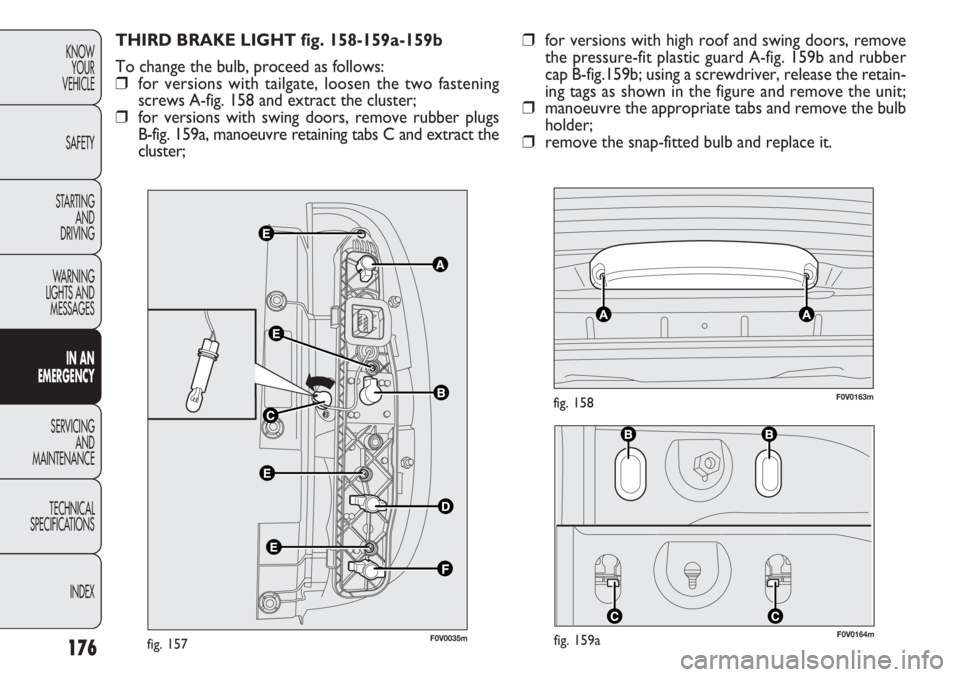
F0V0164mfig. 159a
F0V0163mfig. 158
176
KNOWYOUR
VEHICLE
SAFETY
STARTING AND
DRIVING
WARNING
LIGHTS AND MESSAGES
IN AN
EMERGENCY
SERVICING AND
MAINTENANCE
TECHNICAL
SPECIFICA TIONS
INDEXTHIRD BRAKE LIGHT fig. 158-159a-159b
To change the bulb, proceed as follows:
❒ for versions with tailgate, loosen the two fastening
screws A-fig. 158 and extract the cluster;
❒ for versions with swing doors, remove rubber plugs
B-fig. 159a, manoeuvre retaining tabs C and extract the
cluster; ❒
for versions with high roof and swing doors, remove
the pressure-fit plastic guard A-fig. 159b and rubber
cap B-fig.159b; using a screwdriver, release the retain-
ing tags as shown in the figure and remove the unit;
❒ manoeuvre the appropriate tabs and remove the bulb
holder;
❒ remove the snap-fitted bulb and replace it.
F0V0035mfig. 157
Page 189 of 283
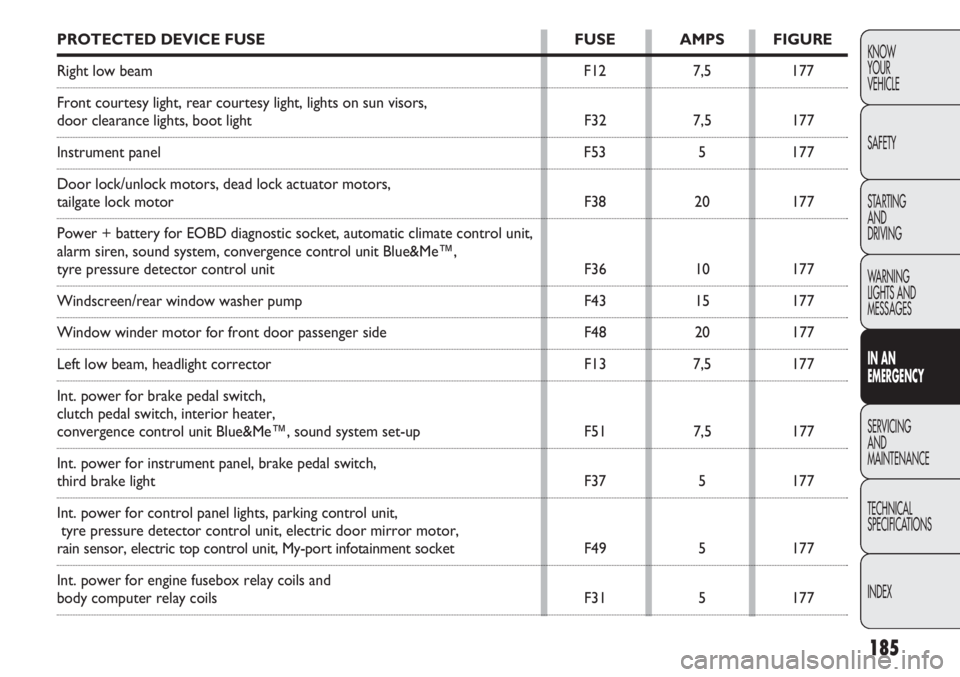
185
KNOW
YOUR
VEHICLE
SAFETY
STARTING
AND
DRIVING
WARNING
LIGHTS AND
MESSAGES
IN AN
EMERGENCY
SERVICING
AND
MAINTENANCE
TECHNICAL
SPECIFICATIONS
INDEXPROTECTED DEVICE FUSE FUSE AMPS FIGURE
Right low beam F127,5177
Front courtesy light, rear courtesy light, lights on sun visors,
door clearance lights, boot light F327,5177
Instrument panel F535177
Door lock/unlock motors, dead lock actuator motors,
tailgate lock motor F3820177
Power + battery for EOBD diagnostic socket, automatic climate control un\
it,
alarm siren, sound system, convergence control unit Blue&Me™,
tyre pressure detector control unit F3610177
Windscreen/rear window washer pump F4315177
Window winder motor for front door passenger side F4820177
Left low beam, headlight corrector F137,5177
Int. power for brake pedal switch,
clutch pedal switch, interior heater,
convergence control unit Blue&Me™, sound system set-up F517,5177
Int. power for instrument panel, brake pedal switch,
third brake light F375177
Int. power for control panel lights, parking control unit, tyre pressure detector control unit, electric door mirror motor,
rain sensor, electric top control unit, My-port infotainment socket F495177
Int. power for engine fusebox relay coils and
body computer relay coils F315177
Page 194 of 283
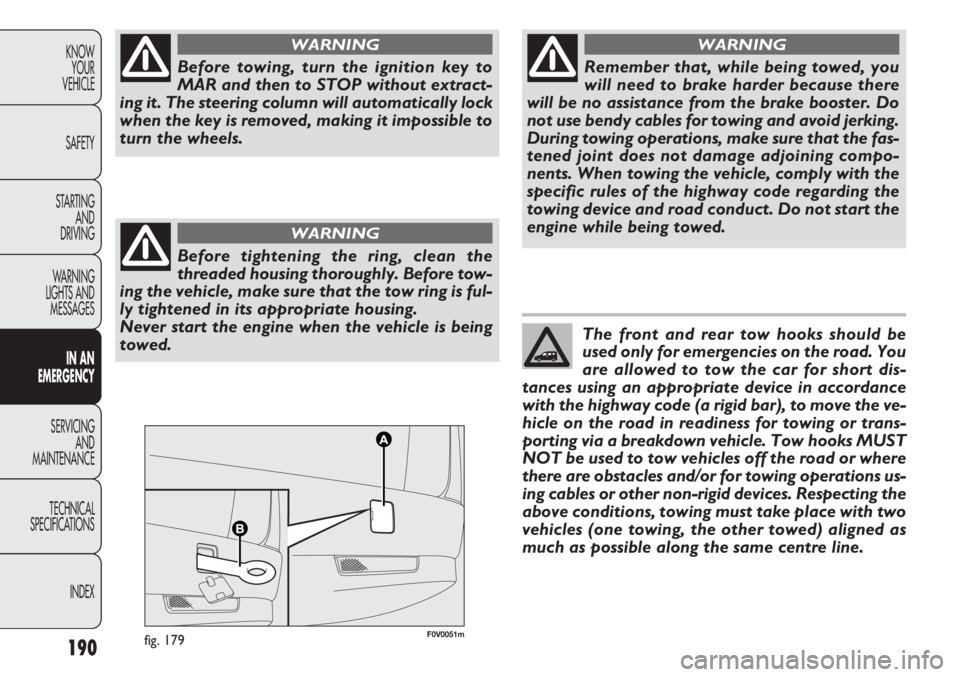
190
KNOWYOUR
VEHICLE
SAFETY
STARTING AND
DRIVING
WARNING
LIGHTS AND MESSAGES
IN AN
EMERGENCY
SERVICING AND
MAINTENANCE
TECHNICAL
SPECIFICA TIONS
INDEX
F0V0051mfig. 179
Before towing, turn the ignition key to
MAR and then to STOP without extract-
ing it. The steering column will automatically lock
when the key is removed, making it impossible to
turn the wheels.
WARNING
Before tightening the ring, clean the
threaded housing thoroughly. Before tow-
ing the vehicle, make sure that the tow ring is ful-
ly tightened in its appropriate housing.
Never start the engine when the vehicle is being
towed.
WARNING
Remember that, while being towed, you
will need to brake harder because there
will be no assistance from the brake booster. Do
not use bendy cables for towing and avoid jerking.
During towing operations, make sure that the fas-
tened joint does not damage adjoining compo-
nents. When towing the vehicle, comply with the
specific rules of the highway code regarding the
towing device and road conduct. Do not start the
engine while being towed.
WARNING
The front and rear tow hooks should be
used only for emergencies on the road. You
are allowed to tow the car for short dis-
tances using an appropriate device in accordance
with the highway code (a rigid bar), to move the ve-
hicle on the road in readiness for towing or trans-
porting via a breakdown vehicle. Tow hooks MUST
NOT be used to tow vehicles off the road or where
there are obstacles and/or for towing operations us-
ing cables or other non-rigid devices. Respecting the
above conditions, towing must take place with two
vehicles (one towing, the other towed) aligned as
much as possible along the same centre line.